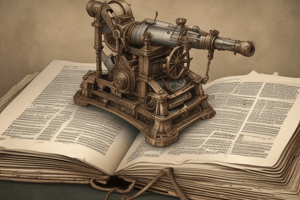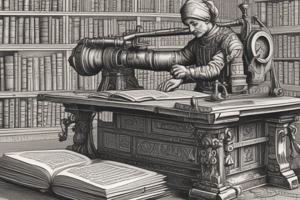Podcast
Questions and Answers
Die von Johannes Gutenberg erfundene Druckerpresse ermöglichte die individuelle Herstellung von Büchern.
Die von Johannes Gutenberg erfundene Druckerpresse ermöglichte die individuelle Herstellung von Büchern.
False (B)
Die Druckerpresse von Gutenberg bestand aus beweglichen Holzbuchstaben.
Die Druckerpresse von Gutenberg bestand aus beweglichen Holzbuchstaben.
False (B)
Die Druckerpresse von Gutenberg verwendete wasserbasierte Tinte.
Die Druckerpresse von Gutenberg verwendete wasserbasierte Tinte.
False (B)
Die Druckerpresse von Gutenberg bestand aus einer kombinierten Schrauben- und Zahnrädermechanik.
Die Druckerpresse von Gutenberg bestand aus einer kombinierten Schrauben- und Zahnrädermechanik.
Die Erfindung der Druckerpresse von Gutenberg führte zu einer Verringerung der Alphabetisierungsraten.
Die Erfindung der Druckerpresse von Gutenberg führte zu einer Verringerung der Alphabetisierungsraten.
Die Druckerpresse von Gutenberg hatte keine Auswirkungen auf die wirtschaftliche und kulturelle Entwicklung.
Die Druckerpresse von Gutenberg hatte keine Auswirkungen auf die wirtschaftliche und kulturelle Entwicklung.
Flashcards are hidden until you start studying
Study Notes
Gutenberg's Press
Invention and Innovations
- Invented by Johannes Gutenberg in the 15th century (around 1440)
- Revolutionized book printing by allowing mass production of books
- Combined existing technologies to create a new printing press
Key Components
- Movable type: individual metal letters and characters that can be rearranged to print different texts
- Oil-based ink: allowed for high-quality printing and durability
- Screw-based press: applied even pressure to print pages cleanly and efficiently
How it Worked
- Type setting: individual characters were arranged to form lines of text
- Inking: the type was inked using an oil-based ink
- Printing: the press applied pressure to transfer the inked image onto paper
- Impression: the printed page was produced, and the process was repeated
Impact and Significance
- Democratization of knowledge: made books more widely available, contributing to a significant increase in literacy rates
- Spread of ideas: facilitated the dissemination of knowledge during the Renaissance and Protestant Reformation
- Economic and cultural impact: created new industries and jobs, and helped to establish a common language and culture
Studying That Suits You
Use AI to generate personalized quizzes and flashcards to suit your learning preferences.




